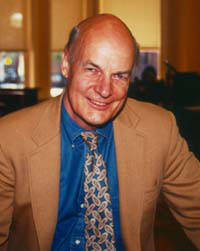McClintock Named to Weinberg Chair
In the last faculty meeting of the 2000-2001 academic year, President Arthur Levine honored Robert O. McClintock, Professor of History and Education, with the John L. and Sue Ann Weinberg Chair in Historical and Philosophical Foundations of Education.
McClintock spoke about what the endowed Chair will mean to him and how he sees it changing his academic career.
"The Chair is," McClintock said, "an honor and opportunity to rethink my purposes and what I'm doing. There are many things in addition to, or adjacent to the chair, that are very important or become more feasible through it."
How will the Chair change his academic pursuits?
"My days have been spent," McClintock said, "responding to the constraints of projects that are important and that are quite worthwhile. But I think it's time to try more systematically to articulate the ideas, the principles, the values at stake and implicit in these projects, and to withdraw, not entirely, but significantly from the day-to-day conduct of those projects to try to devote more of my energies in expressing the ideas behind them."
McClintock sees the Chair as an opportunity for a renewal of purpose.
"I've always thought of myself as being primarily a student of the historical and philosophical foundations of education. For the last 20 years, I've been deeply embroiled in trying to apply digital technologies to the reform of education. To me, the two enterprises are one: the theoretical and the applied side of the same commitment. But it really is an occasion where I can renew the intellectual roots that I have drawn inspiration from throughout my career and I'm very excited about that. I feel it comes at a time when I need that personally, and I think that the world is ripe to try to show how our tradition is embedded in the educational transformations that the new technologies are driving."
What are some of the projects he is interested in exploring?
McClintock said that it's very important to go back to our cultural history and its roots in the western tradition. "I'm looking forward to giving a series of colloquia on fundamental thinkers in our tradition, which builds on a series of short courses that I used to give on Socrates, Plato, Aristotle and on up to Max Weber and John Dewey."
"One of the things that I've been fascinated by in the past," he continued, "is the tradition of political theory and its educational concomitants that surround the idea of a self-governing polis, responsible for itself in historical time."
McClintock said, "I think that we've come through or are coming out of a long period of the dominance of nation states and returning to a period where a great deal of the significant life chances and the quality of life that we experience, will be forged in the context of large urban conglomerations."
"To me, the world that's being knit together by digital technologies and the World Wide Web and Internet, is a world of interacting cities all around the globe. It's time to re-examine the way we understand the educational potentialities of urban life."
"I think the challenge of this Chair is to renovate and resuscitate the idea that, if you want to really a get a great education, you go to the most important cities of the world," he added. "It's where the greatest opportunities for the full development of human possibilities are to be found."
Published Monday, May. 20, 2002
